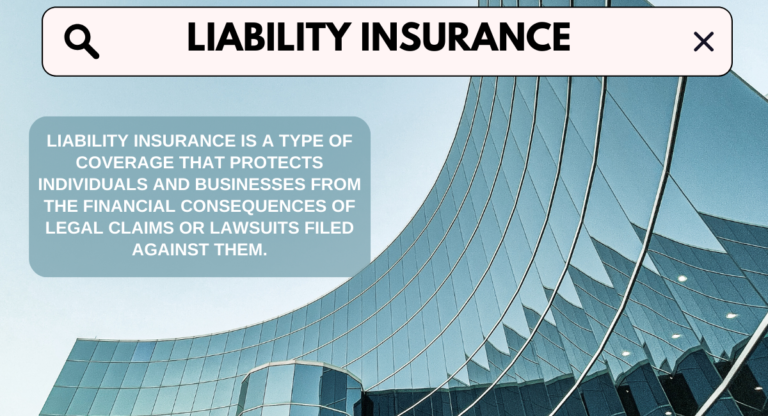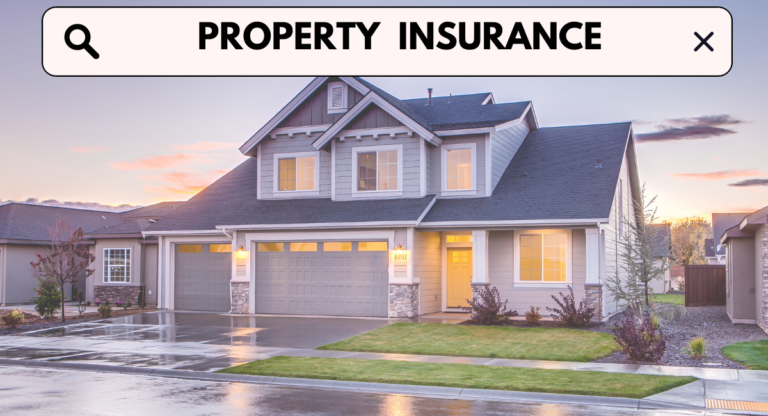Property insurance is a type of coverage that protects your home and its contents from various risks, such as fire, theft, and natural disasters.
For example, if a tree falls on your house during a storm, homeowner’s insurance can assist with the repair costs.
Renters insurance is similar but for those who rent their homes, covering stolen items in a burglary, for instance.
If you own a business and a fire damages the building and equipment, commercial property insurance can help with repair or replacement costs.
Natural disaster insurance is for events like floods, and it can cover damages caused by such incidents.
Fire insurance specifically helps when a fire damages your home, and earthquake insurance is there for structural damage caused by earthquakes.
To choose the best insurance, consider factors such as coverage options, premium costs, customer reviews, and the reputation of the insurance provider.
what is property insurance?
Property insurance is a type of insurance that provides financial protection for physical assets or properties against various risks and perils.
The purpose of property insurance is to help property owners or policyholders recover financially in case their property is damaged, destroyed, or lost due to covered events.
Features
Covered Perils: Property insurance policies typically cover a range of perils, which may include fire, theft, vandalism, natural disasters (such as earthquakes or floods, depending on the policy), and other unforeseen events.
Types of Properties Covered: Property insurance can apply to various types of properties, including homes, commercial buildings, rental properties, and personal belongings inside the property.
Policy Components: Property insurance policies often consist of different components, such as dwelling coverage (for the structure itself), personal property coverage (for belongings inside the property), liability coverage (protection against lawsuits for property-related injuries or damage), and additional living expenses coverage (helping with costs if the property becomes uninhabitable).
Premiums and Deductibles: Policyholders pay regular premiums to the insurance company in exchange for coverage. Additionally, there is usually a deductible, which is the amount the policyholder must pay out of pocket before the insurance coverage kicks in.
Exclusions: Property insurance policies may have certain exclusions, meaning they do not cover specific events or types of damage. It’s important for policyholders to be aware of these exclusions and, if needed, purchase additional coverage for specific risks.
Appraisal and Underwriting: Before issuing a property insurance policy, insurers often assess the property’s value and evaluate potential risks. This process helps determine the appropriate coverage and premium rates.
Is property insurance worth it?
Property insurance is unquestionably worth the investment for homeowners and property owners alike.
It serves as a crucial safety net against unforeseen events that could otherwise lead to significant financial loss.
By covering damages to your home and personal belongings caused by incidents such as fire, theft, vandalism, or natural disasters, property insurance ensures you can repair or replace your assets without bearing the full financial burden.
How Does property insurance Work?
Property insurance is like a safety plan for your stuff. When you own a home, rent a place, or have a business, you can get this insurance.
You pay a certain amount regularly, called a premium, to keep this plan going.
If something bad happens, like a fire or a theft, you tell the insurance company, and they check if it’s something they can help with. You might have to pay a bit first, called a deductible.
After that, they figure out how much it costs to fix or replace your things, and they give you some money to help out. But remember, there’s a limit to how much they’ll pay.
This plan has to be renewed every year, and the amount you pay might change based on your situation.
It’s a way to make sure you don’t lose everything if something unexpected happens to your home or belongings.
The Best Options for Cheap Car Insurance in Texas
Car Insurance Costs in Nigeria: How Much for Basic, Third Party, and Cheapest Options?
Tips for Comparing Insurance Quotes and Saving Money
Types of Property Insurance
what does property insurance cover?
- Dwelling: Protects property structure.
- Personal Property: Covers belongings inside.
- Liability: Protects against responsibility for damage or injuries.
- ALE: Helps with living expenses if property is uninhabitable.
- Fire, Theft, Vandalism: Covers damages from specific events.
- Natural Disaster: Protection against events like floods, earthquakes.
- Windstorm: Covers damages caused by strong winds.
- Builder’s Risk: Protects during construction until completion.
- Earthquake, Flood Insurance: Specific coverage for these perils.
- Loss of Use: Aids with additional living expenses.
- Business Interruption (Commercial): Covers lost income during shutdown.
- Vacant Property: Insurance for unoccupied properties.
- Condo Insurance: Covers personal property, liability, and condo improvements.
Property Insurance benefits
Property insurance brings several advantages to make life easier. It shields you from the financial stress of things going wrong with your property, like damage or loss.
If your home or belongings get damaged, the insurance helps pay for repairs or replacements.
It also looks out for your personal items, provides a safety net if someone gets hurt on your property, and helps cover extra living costs if your place becomes unlivable.
Whether it’s protection from natural disasters, legal support, or adjusting coverage as your needs change, property insurance offers peace of mind.
It’s not just for homeowners; renters and condo owners can benefit too, ensuring that everyone has a safety net in place for life’s unexpected challenges.
property insurance: What You Need to Know?
property insurance includes liability coverage, which protects against legal and medical expenses if someone is injured on your property or if you are responsible for damaging someone else’s property.
The main types of property insurance include homeowners insurance, which covers single-family homes, and renters insurance, which protects the personal belongings of tenants in rental properties.
A property insurance policy is a contract between the policyholder and the insurance company, detailing the terms and conditions of coverage, premiums, deductibles, and exclusions.
The cost and coverage of property insurance are based on factors such as the value of the property, its location, the level of coverage selected, and the risk assessment of potential hazards.
how much is property insurance?
Average annual premiums, average monthly premiums, and the difference from the national average for various states in the United States.
According to the report – In Alabama, the average annual premium is $1,971, with a monthly premium of $164, reflecting a positive difference of $284 from the national average.
Conversely, Alaska has an average annual premium of $1,027 and a monthly premium of $86, resulting in a negative difference of $660.
Property Insurance for home loan
When you get a home loan, the bank usually asks you to have homeowners insurance to protect your house.
This insurance is like a safety net for your home and the things inside it, covering risks such as fires, theft, or damage from bad weather.
The bank wants to make sure your home is financially protected, so having insurance is a requirement for the loan.
Homeowners insurance has different parts:
- Dwelling Coverage: This covers the actual structure of your home.
- Personal Property Coverage: This protects your belongings inside the house.
- Liability Coverage: It helps if someone gets hurt on your property and you’re responsible.
Your insurance policy will have limits on how much it pays, and you’ll choose a deductible, which is what you pay before the insurance helps.
Other things to know:
- There’s also coverage for extra living costs if you have to move out temporarily.
- The cost depends on factors like where your home is, how much it would cost to rebuild, and your coverage choices.
- It’s a good idea to get quotes from different insurance companies to find the best deal.
- Often, insurance payments are part of your monthly mortgage, managed by the bank.
Before you finalize your home loan, make sure you understand what insurance the bank needs and choose a policy that really protects your home and fits your budget
frequently asked questions
Is property insurance useful?
Yes, property insurance is very useful. It protects your home and belongings from various risks such as fire, theft, and natural disasters. In the event of damage or loss, the insurance provides financial support for repairs or replacements, ensuring that you don’t bear the entire financial burden yourself.
Is property insurance mandatory?
While property insurance is not legally mandatory for homeowners in India, it is often a requirement imposed by mortgage lenders. When you take a home loan, the lender typically requires you to have homeowners insurance to protect their financial interest in the property. Even if you own your home outright, having insurance is highly advisable to safeguard your investment and provide peace of mind in case of unforeseen events.
How to make property insurance?
To obtain property insurance, you can contact insurance companies or agents who specialize in homeowners insurance. They will guide you through the process of selecting coverage options, assessing your property’s value, and determining premiums based on factors like location and risk.
What is the maximum tenure of property insurance?
Property insurance policies typically have one-year terms, after which they can be renewed annually. There is no specific maximum tenure, as long as you continue to pay premiums and maintain the policy.










